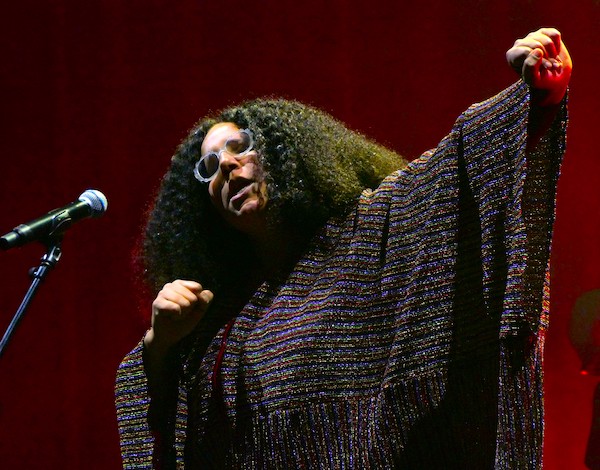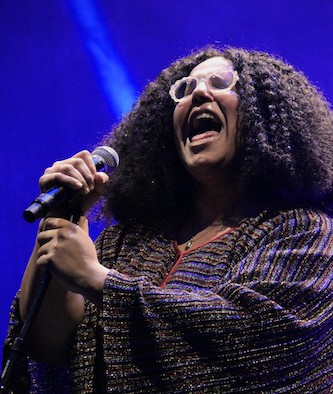Concert Review: Brittany Howard — A Determined Musical Evolution
By Paul Robicheau
The set impressed in its diversity, boosted by the cohesive breadth of What Now, even as its homages grew overt in the second half.

Brittany Howard at the Wilbur. Photo: Paul Robicheau
There’s a level of comfort and conformity to being in a relationship, be it a romantic partnership or a rock band. Brittany Howard has been in both, knew when it was time to move on, and used those experiences to forge her future.
Once the force of nature who fronted Alabama Shakes, Howard left that group after its chart-topping 2015 second album Sound & Color to launch a solo venture. With her own second release What Now, Howard rekindles her sonic and spiritual calling from the ashes of personal travails, and Monday’s triumphant show at the Wilbur proved that she’s caught up — and surpassed the palette of Sound & Color.
Arriving with arms raised in peace signs, the singer opened with the new “Earth Sign,” flanked by an eight-piece band that kept crack jazz drummer Nate Smith and Alabama Shakes bassist Zac Cockrell in the fold while doubling up on keyboardists, guitarists (Howard an occasional third), and female backup singers. “There’s a love waiting for me,” Howard sang. “I can feel it. I can’t see. But will I know?” Fans in the sold-out theater could clearly feel it too — and answered her in affirmation.
Displaying a range as wide and woolly as her hairstyle, Howard performed all 11 songs from What Now (plus its recorded Maya Angelou interlude) across an 80-minute set also dotted with eight tracks from her 2019 solo debut Jaime. One just wished the performance lasted a bit longer, since most of her songs remained short. Brevity offers an advantage on record. But in a live set brimming with vitality and variety, as soon as Howard dug into a song’s groove with momentum (most notably in the surprising club-thumper “Prove It to You”), the tune seemed to end prematurely.

Brittany Howard at the Wilbur. Photo: Paul Robicheau
The exception came in the mid-set sermon “13th Century Metal,” a Jaime track stretched to several minutes (including a quick but impactful drum solo). Over a chaotic bed of staccato keys and percussion, Howard championed the spread of enlightenment, love, compassion, and humanity. “I am a master student,” she testified in toppling spoken word, “and my spirit will never be stomped out!”
Howard didn’t manipulate her vocals the way she does in the studio or overplay her pure prowess as a singer on Monday. But when she hit high-scaling notes over the chattering beat of “Red Flags” or falsetto swoops in the slow jam “Baby,” her singular voice stood out. Howard flirted across “Stay High” in a register above her backing singers, clapped her hands, let out a “Woo!,” and elevated a kick under her sparkly dark robe. And the three-part vocals of “To Be Still” cast chills with a slightly atonal blend similar to its recording, even if Howard’s live crew couldn’t quite distill all the new album’s harmonic and rhythmic textures.
The expanded touring band nonetheless succeeded in realizing Howard’s distinct vision, which leans to old-school R&B/soul influences with modern avant-garde touches. The set impressed in its diversity, boosted by the cohesive breadth of What Now, even as its homages grew overt in the second half.
“Every Color in Blue” evoked Radiohead in juxtaposing cyclical guitar patterns over floating double-time beats. The funky “Power to Undo” brashly nodded to Prince as Howard sang “You have the power!” and pulled moans of sustain from her electric guitar. Then she closed the set alone, gently plucking nylon-string guitar like a Brazilian balladeer in “Short and Sweet,” crooning, “I may be a fool to dream of you, but God, it feels so good to dream at all.”
The band returned to start the encore with “Another Day,” its echoes of Curtis Mayfield less enunciated than on record. “I’m in love while the world is on fire,” she sang with an optimistic, celebratory flourish. “I am having the time of my life.”
But when she ended the night with the title track of What Now, Howard no longer played outwardly to the audience. She grasped the mic stand and burrowed into the song’s relationship faceoff with a partner who isn’t open to growth, the singer accepting the blame to leave their impasse behind, declaring “I ain’t sorry!” over and over. Howard could say the same about her determined musical evolution.
Paul Robicheau served more than 20 years as contributing editor for music at the Improper Bostonian in addition to writing and photography for the Boston Globe, Rolling Stone, and many other publications. He was also the founding arts editor of Boston Metro.
